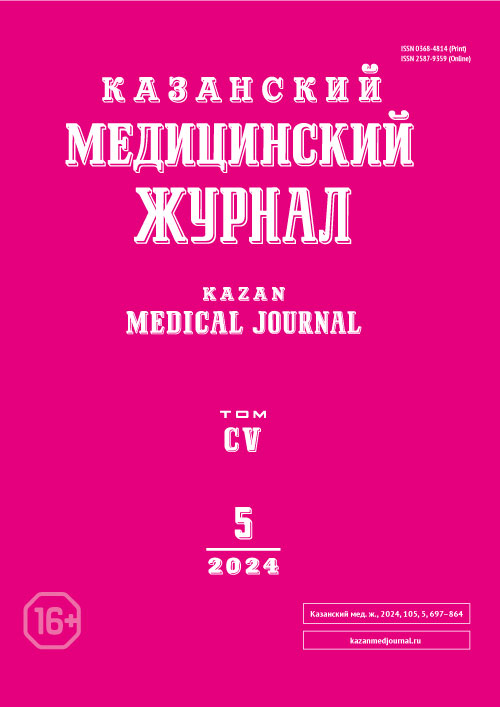Symmetrizing operations using endoprostheses in patients with breast cancer
- Authors: Orlov A.E.1,2, Kaganov O.I.1,2, Tkachev M.V.1,2, Karetnikova N.V.2
-
Affiliations:
- Samara Regional Clinical Oncology Dispensary
- Samara State Medical University
- Issue: Vol 105, No 5 (2024)
- Pages: 845-851
- Section: Clinical experiences
- Submitted: 27.03.2024
- Accepted: 19.07.2024
- Published: 05.09.2024
- URL: https://kazanmedjournal.ru/kazanmedj/article/view/629488
- DOI: https://doi.org/10.17816/KMJ629488
- ID: 629488
Cite item
Abstract
BACKGROUND: Improving the strategy of surgical treatment of breast cancer is an important and urgent task for a physician at the present stage.
АIM: To evaluate the immediate results and quality of life indicators of patients using the two-stage reconstruction technique with symmetrizing operations.
MATERIAL AND METHODS: The retrospective study included the results of treatment of 126 patients with a diagnosis of breast cancer in the Samara Regional Clinical Oncology Dispensary in the period 2018–2022. Patients of the comparison group (n=72) underwent two-stage reconstruction with an expander, 54 patients of the main group — two-stage reconstruction with the performance of a symmetrizing operation. Patients from the comparison group and the main group were comparable in age, disease stage, biological subtypes of the tumor. Before the operation, at an appointment with an oncologist, the quality of life indicators’ assessment of patients of both groups was performed using the SF-36 questionnaire (which did not differ statistically significantly), then these parameters were assessed 6 months after the operation. Statistical processing of the obtained results was carried out using parametric (Student's t-test) and nonparametric (Mann–Whitney test, χ2 test and Fisher's exact test) methods. The significance criterion in the study was p <0.05.
RESULTS: The immediate results of surgical treatment in the compared groups did not differ statistically significantly: the average operation time in the control and main groups was 125±25 and 153±33 min, respectively (p=0.874); intraoperative blood loss reached 50±17 and 65±21 ml (p=0.347); the duration of postoperative lymphorrhea was 12±4 and 14±3 days (p=0.621); postoperative bed-day was 12±2 and 13±3 days (p=0.541), respectively. According to the scale of physical condition, social functioning, psychological health and vital activity, assessed by patients using the SF-36 questionnaire by means of a survey, after 6 months, women who underwent two-stage reconstruction with symmetry surgery had a statistically significant advantage: in the control group, according to the scale of physical condition — 47.51±10.72 points, in the main group — 72.34±12.63 points (p=0.041); according to the scale of social functioning — 42.42±19.81 and 78.12±14.23 points (p=0.003); according to the scale of mental health — 44.31±21.32 and 81.42±8.81 points (p=0.008); according to the vital activity scale — 59.12±13.57 and 65.21±18.24 points (p=0.026), respectively.
CONCLUSION: Patients of the main group 6 months after the symmetrizing operation have better quality of life indicators compared to the comparison group.
Full Text
About the authors
Andrey E. Orlov
Samara Regional Clinical Oncology Dispensary; Samara State Medical University
Email: OrlovAE@samaraonko.ru
ORCID iD: 0000-0001-6145-3343
SPIN-code: 8902-5712
MD, Dr. Sci. (Med.), Head of Depart., Depart. of Public Health and Health Organization of the IPO; Chief Physician
Russian Federation, Samara; SamaraOleg I. Kaganov
Samara Regional Clinical Oncology Dispensary; Samara State Medical University
Email: okaganov@yandex.ru
ORCID iD: 0000-0003-1765-6965
SPIN-code: 2705-4187
MD, Dr. Sci. (Med.), Prof., Head of Depart., Depart. Oncology; Deputy Chief Physician
Russian Federation, Samara; SamaraMaksim V. Tkachev
Samara Regional Clinical Oncology Dispensary; Samara State Medical University
Email: m9277477577@mail.ru
ORCID iD: 0000-0002-4183-0647
SPIN-code: 9681-0358
MD, Dr. Sci. (Med.), Assistant, Depart. of Oncology; Oncologist
Russian Federation, Samara; SamaraNelly V. Karetnikova
Samara State Medical University
Author for correspondence.
Email: karetnikova_nelli@mail.ru
ORCID iD: 0009-0007-0946-8047
SPIN-code: 4392-7487
student
Russian Federation, SamaraReferences
- Breast. Globocan. 2020. Available from: https://gco.iarc.fr/today/data/factsheets/cancers/20-Breast-fact-sheet.pdf Accessed: Mar 15, 2024.
- Baichorov EA, Zikiryakhodzhaev AD, Przhedetsky YuV, Duadze IS. Reconstructive plastic surgery in patients with breast cancer using the acellular dermal matrix and mesh implant. PA Herzen Journal of Oncology. 2020;9(4):2531. (In Russ.) doi: 10.17116/onkolog2020904125
- Torre LA, Bray F, Siegel RL, Ferlay J, Lortet-Tieulent J, Jemal A. Global Cancer Statistics, 2012. CA Cancer J Clin. 2015;65(2):87–108. doi: 10.3322/caac.21262
- Oei SL, Thronicke A, Grieb G. Evaluation of quality of life in breast cancer patients who underwent breast-conserving surgery or mastectomy using real-world data. Breast Cancer. 2023;30(6):1008–1017. doi: 10.1007/s12282-023-01494-x
- Monogarova MA, Bit-Sava EM, Kurbanova MG. Assessment of the quality of life of breast cancer patients after various types of surgical interventions. Practical oncology. 2021;22(4):298–305. (In Russ.) doi: 10.31917/2204298
- Monton J, Torres A, Gijon M. Use of symmetry assessment methods in the context of breast surgery. Aesthetic Plast Surg. 2020;44(5):1440–1451. doi: 10.1007/s00266-020-01755-6
- Mazaeva BA, Karpov OE. Choice of reconstructive-plastic operation to patient with breast cancer. Bulletin of Pirogov National Medical & Surgical Center. 2018;13(1):139–142. (In Russ.) EDN: YVXIZY
- Bit-Sava EM, Sedov VM, Monogarova MA, Akhmedov RM, Balandov SG. Reconstructive plastic surgeries in patients with breast cancer. Tumors of female reproductive system. 2014;(S): 80–81. (In Russ.)
- Moiel D, Thompson J. Mastectomy or breast-conserving therapy: Which factors influence a patient's decision? Perm J. 2019;23(3):18–49. doi: 10.7812/TPP/18-049
- Zucca-Matthes G, Manconi A, Costa Viera RA, Depieri Michelli RA, Matthes ACS. The evolution of mastectomies in the oncoplastic breast surgery era. Gland Surg. 2013;2:102–106. PMID: 25083466
- Garcia Arroyo JM, Domínguez Lopez ML. Psychological problems derived from mastectomy: A qualitative study. Int J Surg Oncol. 2014;2011:2064–2072. doi: 10.1155/2011/132461
- Potter S, Conroy EJ, Cutress R. Short-term safety outcomes of mastectomy and immediate implant-based breast reconstruction with and without mesh (iBRA): A multicentre, prospective cohort study. Lancet Oncol. 2019;20(2):254–266. doi: 10.1093/bjs/znac077
Supplementary files










